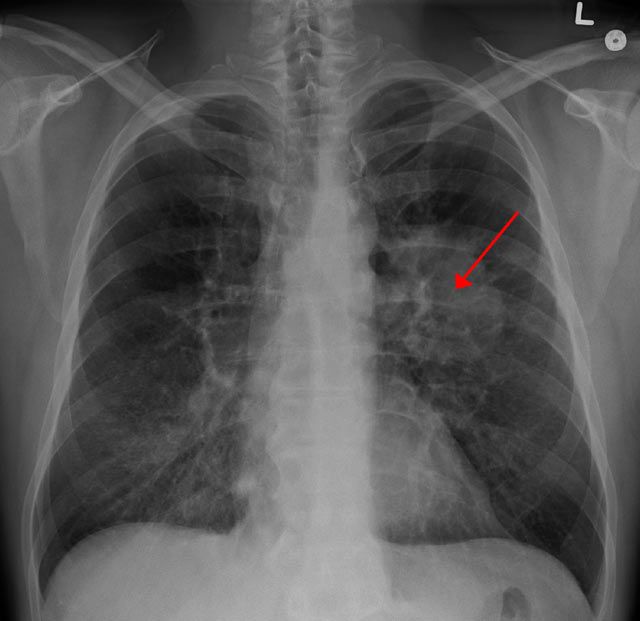Here's why you should kick the butt right now before one of these smoking-related ailments make you its next victim
On the occasion of World No Tobacco Day, which is May 31, we are republishing an earlier feature. We are sure after reading this feature you will spread awareness about the perils of smoking and tobacco.

Photographs: Scott Barbour/Getty Images
Although India has been no stranger to the art of smoking, with evidence of cannabis being smoked dating back to around 2000 BC, it was only in the 1600s that Indians were introduced to tobacco.
According to the World Health Organisation, India is now home to about 12 per cent of all smokers in the world. An approximate 900,000 Indians die everyday due to smoking.
900 of these are under 30.
If you still believe that you couldn't possibly be one of them, here are 10 reasons for you to kick the butt right now before one of these smoking-related ailments make you it's next victim:
1. Coronary artery disease
Despite the ailment's longstanding association with obesity, smoking too has been shown to increase the risk of coronary artery disease and myocardial infarction.
Coronary artery disease occurs due to plaque clogging the arteries, due to which the heart does not receive adequate blood supply.
"The concept is that you have a blood flow to the heart through the blood vessel," explains Dr Arihant Dalal, MD, "and when plaque forms, it narrows down the blood flow. Smoking has shown to increase the tendency of the blockage of the blood flow thereby leading to cardiac arrest."
60 per cent of heart patients are expected to live in India by 2016, which is no surprise considering that heart disease is already the leading cause of death among Indians, especially the younger ones.
25 per cent of those who suffer from cardiac arrest are under the age of 40.
Not only are smokers twice as likely to suffer from heart attack as compared to non-smokers, but they also suffer from it earlier than non-smokers.
However, the buck doesn't seem to stop at the heart and the formation of plaque in the blood vessels, says Dr Dalal, "A similar process happens in the other parts of the body."
2. Stroke

Photographs: Ian Waldie/Getty Images
Not only does smoking leads to an unhealthy heart, it also leads to an unhealthy mind.
"Stroke happens because of a blockage of the blood flowing from the carotid artery to the brain.The concept is the same. If it happens in the heart, it leads to what is called as heart attack; if it happens in the brain, it will lead to a stroke."
Stroke, or cerebrovascular accident, can cause paralysis, partial blindness, poor motor and speech skills and even death.
Cigarette smoke has a tendency to thicken the blood of the smoker, hence making it easier to form clots which can compromise the flow of blood to your brain.
20 per cent of Indians who are admitted after their first stroke are aged 40 or younger.
Smoking can increase your chance of having an ischemic stroke two fold. Whereas the chances of smokers having a haemorrhagic stroke increases up to four fold.
India accounts for 11 per cent of all deaths by ischemic strokes caused by tobacco consumption.
3. Peripheral vascular disease

Photographs: Ahmed Jadallah/Reuters
According to Dr Dalal, "The peripheral vascular disease also sees the same pathology happening to the blood flow to the limbs. The blood supply to the arms and the legs gets compromised. That's why people get gangrene and sometimes even amputations have to be carried out."
15 per cent of the world's population is affected by PVD, although most people do not take the initial signs seriously.
Numbness in the lower half of the body, lower tetemperaturef legs or feet and ulcers that either heal very slowly or do not heal at all are symptoms that are taken for granted as a normal part of aging.
Smoking is listed as the single most important contributing factor for the development of PVD. So smokers are ten times more likely than non-smokers to be at risk of the disease. Persons who are current smokers or have been smokers at any point in their lives make up 80-90 per cent of the patients who suffer from PVD in their lower body.
4. Berger's Disease

Photograph: Intermedichbo/Wikimedia Commons
However, PVD isn't the scariest thing out there.
"Berger's Disease is an even more aggressive form of peripheral vascular disease," warns Dr Dalal, "seen in younger people, especially in young females, in which they have blockage of the blood flow even in their 20s or 30s and have their limbs amputated.
As it has been with the rest of the above listed ailments, Berger's Disease (medically known as IgA nephropathy) too "has a very strong association with smoking."
The number of cigarettes a person smokes is directly proportional to their chance of developing Berger's Disease.
Berger's Disease is rarely known to surface in India. However, the known cases are marked by their seriousness, leading experts to believe that these are only a very small fraction of the whole. Despite this, Berger's Disease accounts for up to 16 per cent of the biopsy samples from India.
5. Chronic obstructive lung disease

Photograph: Jmarchn/Wikimedia Commons
Chronic obstructive lung disease, or COLD, is also commonly known as Smoker's Lung and is primarily characterised by symptoms such as wheezing, excess production of sputum and shortness of breath.
In COLD, the patient finds it difficult to breathe the air out of their lungs as the disease includes breaking down of lung tissue and the deterioration of the ability of airways and airsacs to expand and contract.
It has been suggested that 5 per cent of the Indian population suffers from COLD, with higher rates of prevalence among smokers. As per studies conducted by the World Health Organisation, of all deaths that occur due to COPD, 90 per cent of them take place in middle and low income countries.
COLD is expected to be the third most prevalent cause of death worldwide by the year 2030.
Cigarettes have been identified as the primary cause of COLD with almost 9 out of 10 ten COLD-related deaths occurring due to tobacco smoking.
If the inability to perform the most important function of your everyday life, i.e. breathing with ease, isn't enough to make you kick the butt, Dr Dalal has more bad news, "COLD is an irreversible and progressive disease which happens after years of smoking.
In the initial part of the disease, if you quit smoking early enough, the damage may be reversed to an extent but in the later part of the disease pathology it is essentially an irreversible damage.
So, even if you stop smoking, it is unlikely to get better. But the continuous smoke is obviously much worse. Such people have symptoms such as gasping for air, chronic cough, pneumonia, repeated infections etc. They often times need to be on oxygen 24 hours a day."
It isn't just smokers who should beware. Even non-smokers inhaling passive smoke are at risk.
"Passive smoking has also shown to increase the chances of COLD and lung cancer, especially in households where children are exposed to second hand smoke."
6. Lung cancer

Photograph: James Heilman/Wikimedia Commons
Another effect of smoking is the increased chance of cancer, specifically adenocarcinoma of the lungs," says Dr Dalal. "There can be more than one kind of lung cancer but smoking increases the chances of adenocarcinoma."
Although adenocarcinoma of the lung is the most prevalent cancer found in non-smokers, it is also the most prevalent form of lung cancer found in smokers and accounts for 40 per cent of all cases of lung cancer.
According to data collected by the Tata Memorial Centre, the number of men and women diagnosed with cancer of the lungs and bronchi is 90,000 and 79,000 respectively. However, women who smoke are at a higher risk of developing lung cancer as compared to men.
Non-smokers too can develop lung cancer, but smokers are almost three times more likely to suffer from it.
7. Respiratory problems

Photograph: Rafael Marchante/Reuters
Smoking can exaggerate or flair up other diseases of the lung which may be unrelated to smoking," says Dr Dalal.
"For example, diseases which are related to inhaling a pollutant or silicosis. People who work in the mines, industrial workers etc have a different kind of lung pathology. But even if they continue to smoke, their disease, which may be unrelated to smoking, can get worse."
In a country where 30 per cent men and 3-5 per cent women smoke, smoking poses a great health risk not only for those with smoking-related ailments but even for those without unrelated illnesses; and at the rate which we're going, smoking bidis and cigarettes will prove to be fatal to 25 per cent of all smokers between the ages of 25 and 69, who will lose a good two decades of their lives.
50 per cent of TB-related deaths among men are caused by smoking.
Parental smoking is known to cause or aggravate present respiratory disorders among children, who act as passive smokers. It also increases the chances of the child developing asthma or, in extreme cases, COPD and lung cancer.
"The earlier you start smoking, the higher are the chances of having health complications -- even as early as your 30s and 40s, because you've been exposed to it for a period of 20-25 years."
8. Urinary bladder cancer

Photograph: Blausen Medical Communications, Inc./Wikimedia Commons
Dr Dalal reveals a shocking fact. "Smoking has a very strong association with urinary bladder cancer, even stronger than it does with lung cancer."
Urinary bladder cancer is a type of malignant tumor that arises from the epithelial lining of the bladder. Symptoms include pain while urinating, blood in the urine, frequent urges to urinate and pain in the lower back.
Tobacco smoking has been established as the main risk factor that leads to urinary bladder cancer. Although passive smoking has not shown to be having much to do with this type of cancer, the risk of developing it is directly proportional to the amount of tobacco smoked.
It has been proven that urinary bladder cancer is caused by smoking in half of the male patients and a third of the female patients. Smoking-related bladder cancer cases account for up to 70 per cent of all bladder cancer cases in the Western world. The exact number in India are yet unknown.
The risk of smokers developing urinary bladder cancer is as much as 3 times higher than that of non-smokers.
9. Low fertility

Photograph: Ajay Verma/Reuters
Despite India being the second most populous nation in the world, 15 per cent of Indians today are infertile and the infertility rate for those between 31 and 40 years of age is as high as 46 per cent.
According to Dr Ridhi Sharma, "Smoking releases free radicals which damage tissues and cells in the body.
Not only does it lower the levels of antioxidants in the body, which also have a role to play in immunity and healing, it also decreases sperm count and causes issues with impotence.
In women it decreases infertility."
Smoking is believed to increase the risk of infertility and impotency in male smokers by 50 per cent. Similarly, women who smoke are 30 per cent less likely to conceive as compared to non-smokers.
A 23 per cent decrease in sperm concentration has been observed among men who smoke. Whereas, smoking is supposed to affect the way estrogen is released in women. It has been suggested that smoking lowers the amount of estrogen produced in the female body.
10. Delayed healing

Photograph: STRINGER Iraq/Reuters
Australia-based surgeon Dr Bhavin Jadav elaborates on how smoking doesn't just cause diseases, it also gets in the way of the healing process.
"The risk of complications like surgical wounds and some fractures not healing doubles for smokers."
Smoking has been shown to damage red blood cells, bone cells and even the white blood cells, which are essential for healing.
"Smoking inhibits micro-vascular blood supply which is essential for building collagen," explains Dr Jadav.
"Building collagen is the essential stage of any tissue healing as collagen is the basic structural protein tissue.
So smokers have difficulty in healing their surgical wounds and bone fractures.
And wounds that don't heal in time also get infected. Smokers have infection in surgery more often than non smokers.
So we advice people who need surgery for fractures quit smoking immediately and use patches."
Smokers have additional recovery issues since smoking affects the heart and blood pressure negatively, along with damaging lungs and blood tissue.
Smokers have lower oxygen levels in their blood, which further delays healing.
In extreme cases, wounds and fractures do not heal at all.
Note: All pictures used only for representational purposes






 © 2025
© 2025